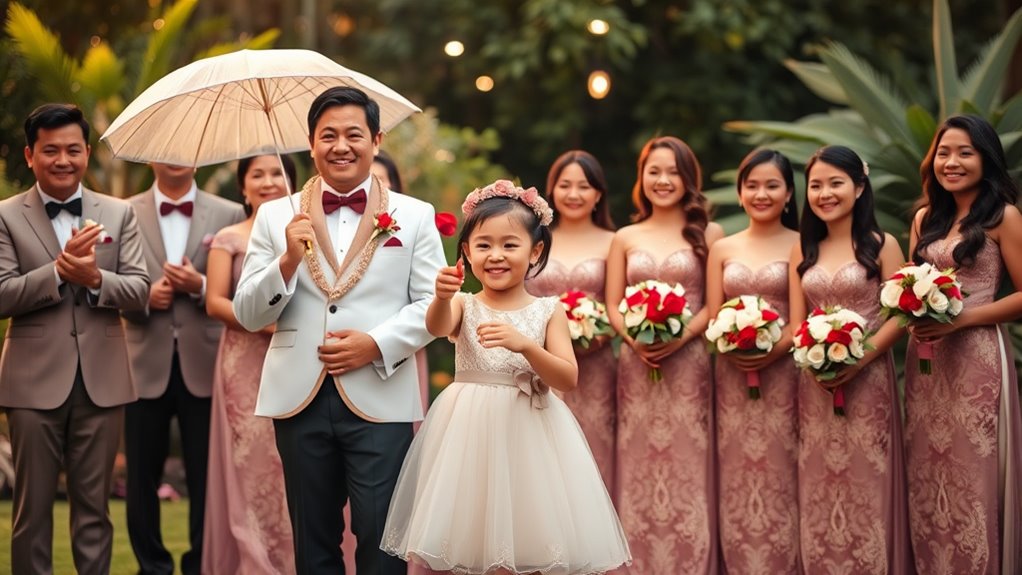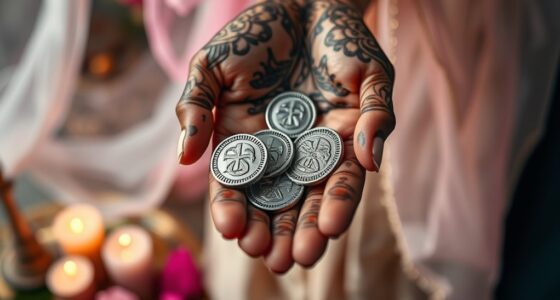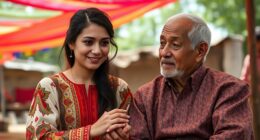In a Filipino wedding, your entourage plays a meaningful role in supporting the couple and showcasing cultural traditions. From the ninongs and ninangs who symbolize family support, to the groom’s and bride’s attendants dressed in traditional Filipiniana or barong Tagalog, each member has a purpose. They participate in rituals like the veil and cord ceremonies, provide emotional support, and help create a lively, unforgettable celebration. Want to discover exactly who does what? Keep exploring to learn more.
Key Takeaways
- The Filipino wedding entourage includes roles like ninongs, ninangs, bridesmaids, groomsmen, flower girls, and ring bearers, each with cultural significance.
- Ninongs and ninangs serve as godparents, sponsors, and moral supporters, often responsible for financial and emotional support.
- Bridesmaids and groomsmen help with preparations, coordinate rituals, and maintain the festive atmosphere during the wedding.
- Flower girls and ring bearers add charm, innocence, and assist in ceremonial tasks like carrying flowers or rings.
- All members traditionally wear Filipino attire such as barong Tagalog and Filipiniana dresses, symbolizing pride and cultural heritage.

A Filipino wedding entourage plays an essential role in making the special day memorable and smooth. As a member of the entourage, whether you’re a ninong, ninang, bridesmaid, or groomsman, your presence symbolizes support, tradition, and unity. Your involvement isn’t just about standing beside the bride and groom; it’s about actively participating in the rich cultural heritage that makes Filipino weddings unique. One of the most noticeable aspects of this tradition is the attire. Wearing traditional attire like the barong Tagalog for men and the Filipiniana dress for women highlights Filipino pride and respect for customs. These outfits add a touch of elegance and help preserve the cultural identity during the celebration. When you don traditional attire, you’re not just dressing up; you’re embodying the history and significance of Filipino wedding rituals.
Speaking of wedding rituals, your role in these ceremonies is crucial. From the veil and cords ceremonies to the candle lighting, each ritual carries symbolic meaning that signifies the couple’s union and their community’s blessings. As part of the entourage, you might be asked to assist in these rituals, ensuring they proceed smoothly and respectfully. For instance, during the veil ceremony, you might help place the veil over the bride and groom, symbolizing their unity in faith and love. During the candle lighting, you could hold the candles or ensure they stay lit to represent the light of their love guiding their future. These rituals are deeply rooted in tradition, and your active participation helps keep the spirit of Filipino culture alive during the wedding.
Beyond the ceremonies, your responsibilities extend to supporting the couple emotionally and practically. Coordinating with other members of the entourage ensures everything runs on schedule, from the preparation to the reception. Your presence also adds to the festive atmosphere, especially with the lively music, dances, and rituals that follow. The role of the flower girl or ring bearer is to add charm and innocence, often scattering flowers or carrying symbolic tokens, emphasizing the purity and promise of new beginnings. As a bridesmaid or groomsman, you’re expected to help with last-minute arrangements, calm nerves, and maintain the joyous spirit of the occasion. Additionally, understanding the importance of cultural traditions can help you better appreciate and uphold the meaningful aspects of Filipino wedding customs.
In essence, being part of a Filipino wedding entourage means actively celebrating and upholding age-old traditions. Your traditional attire and participation in wedding rituals deepen the cultural significance, making the event more meaningful for everyone involved. It’s a collective effort to honor the couple and ensure their special day is truly unforgettable.
Frequently Asked Questions
How Are Wedding Roles Assigned Among Filipino Entourage Members?
When assigning wedding roles, you’ll find that cultural variations influence responsibilities and selections. Typically, family members or close friends are chosen based on their relationship to the couple, with roles like ninongs and ninangs signifying their importance. You might also consider their ability to fulfill specific duties, such as giving speeches or participating in traditions. Ultimately, you decide based on trust, connection, and the significance of their role in your special day.
Can Foreign Guests Participate in Filipino Wedding Entourage Roles?
Did you know that over 30% of Filipino weddings feature foreign guests actively participating in the entourage? You can definitely take part in Filipino wedding roles; it’s a beautiful way to embrace cultural integration. Your participation helps build bonds, and the couple often welcomes guest participation with open arms. So, if you’re invited to join as a ninong, flower girl, or other role, go ahead—you’re adding to the festive spirit!
Are There Traditional Responsibilities for Each Filipino Wedding Role?
You might wonder if each Filipino wedding role has specific responsibilities. Yes, these roles carry cultural significance, reflecting family ties and traditions. For example, ninongs and ninangs are responsible for supporting the couple emotionally and financially, while flower girls and ring bearers add to the ceremony’s charm. Understanding these role responsibilities helps you appreciate their importance and the deep cultural meaning behind each position during the wedding.
How Do Modern Filipino Weddings Adapt Traditional Entourage Roles?
Imagine a wedding where tradition meets today’s spirit—your role adapts with flair! Modern Filipino weddings embrace cultural adaptations, blending age-old responsibilities with fresh responsibilities that reflect your personality. You might still hold the ring, but now you also take on social media duties or emotional support. These modern responsibilities honor tradition while celebrating your individuality, creating a vibrant, meaningful wedding experience that respects the past and excites the future.
What Etiquette Is Expected From Filipino Wedding Entourage Members?
You’re expected to follow cultural expectations and dress codes when participating in a Filipino wedding entourage. Dress appropriately—often elegant and modest, reflecting tradition and respect. Be punctual, supportive, and attentive during the ceremony and reception. Show respect to elders, follow the bride and groom’s guidance, and participate actively in traditions. Your role is to help create a joyful, seamless celebration while honoring cultural norms.
Conclusion
Now that you know the roles from ninongs to flower girls, you’re ready to be part of a truly memorable Filipino wedding. Embrace your role, whether you’re the one holding the veil or the one giving the toast. Remember, every detail adds to the magic — just like a well-orchestrated symphony. So, step in with joy and pride, and make sure this celebration feels as timeless as a classic novel, even if it’s set in a modern world.









